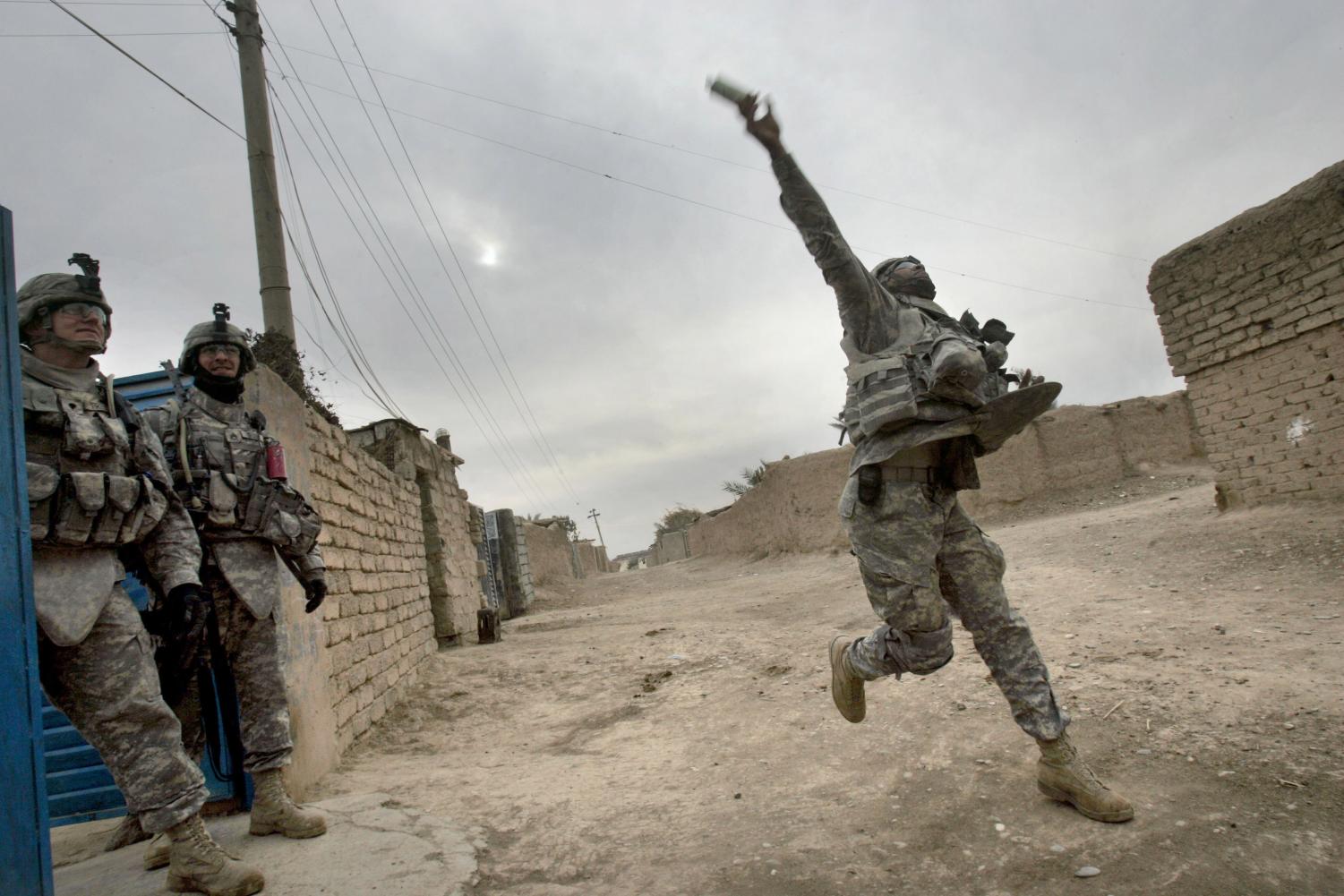U.S. bombers and jet fighters unleashed 40,000 pounds of explosives on the southern outskirts of Baghdad within 10 minutes Thursday in one of the biggest airstrikes of the war, flattening what the military called safe havens for al-Qaida in Iraq.
The massive attack, carried out above approaching U.S. and Iraqi troops, was part of Operation Phantom Phoenix, a nationwide campaign launched Tuesday against al-Qaida in Iraq.
Maj. Alayne Conway, a spokeswoman for troops in the Multi-National Division-Center, which controls the broad swath of territory south of Baghdad, said the amount of ordnance dropped in 10 minutes nearly exceeded what had been dropped in that region in any month since the U.S. military surge began in earnest in June 2007.
Conway said the air attack ”was one of the largest airstrikes since the onset of the war” in March 2003.
The air raid was followed by a ground attack that led to 12 arrests and the discovery of two houses used to torture kidnap victims, according to an Iraqi army officer. He said the troops faced no resistance.
By nightfall, U.S. troops had advanced to Zambaraniyah, a farming village nine miles southeast of the capital and at the edge of the region that was heavily bombed.
A military statement said two B-1 bombers and four F-16 fighters dropped the bombs on 40 targets in Arab Jabour in 10 strikes. Al-Qaida fighters are believed to control Arab Jabour, a Sunni district lined with citrus groves and scarred by daily violence.
”Thirty-eight bombs were dropped within the first 10 minutes, with a total tonnage of 40,000 pounds,” the statement said.
The Iraqi army officer, whose unit is in the Arab Jabour area, said the airstrikes began at 8 a.m. and led to the burning of several citrus groves and the destruction of two houses used by gunmen. He said soldiers confiscated documents and weapons including AK-47s.
The army officer spoke on condition of anonymity because he was not authorized to speak to the media. But Sheik Mahmoud Kamil Shebib, a local Sunni leader who has turned against al-Qaida in Iraq, independently gave a similar account.
Moahmoud Chiad, who lives on the edge of Arab Jabour, said that when he left his house in the morning, he was surprised to see many U.S.-Iraqi checkpoints in the area with Iraqi security forces ordering people, through loudspeakers, to stay home.
”After this, we saw U.S. helicopters hovering over the area while the sounds of jet fighters were also heard,” he said. ”Minutes later, there was the sounds of big explosions. We saw fire and smoke coming out from some groves. Then, the gunfire crackled in the groves, but it ended by noon.”
The attack came a day after the U.S. military reported that nine American soldiers were killed north of the capital in the first two days of a new offensive.
Many militants have fled U.S. and Iraqi forces massing north of Baghdad in Diyala province. Like Arab Jabour, Diyala is an agricultural area that has defied the trend toward lower violence.
The campaign’s scope is nationwide but is mainly focused on gaining control of Diyala and its most important city, Baqouba, which al-Qaida has declared the capital of its self-styled Islamic caliphate.
Six soldiers were killed and four were wounded Wednesday in a booby-trapped house in Diyala, the U.S. command said. It also announced that three U.S. soldiers were killed and two wounded in an attack Tuesday in Salahuddin province, north of Diyala.
The toll marked some of the deadliest days for U.S. forces in Iraq since last fall. For all of December, 23 U.S. soldiers died in the country.
The blows against U.S. troops came as extremists tried to stay ahead of the military advance. Al-Qaida fighters retreated north from Diyala, presumably to Salahuddin, the top U.S. commander in northern Iraq, Maj. Gen. Mark P. Hertling, said Wednesday.
”Operational security in Iraq is a problem,” he said, noting that the Iraqi army uses unsecured cell phones and radios. ”I’m sure there is active leaking of communication.”
Hertling said his troops had killed 20-30 insurgents in the first two days of the operation. It was unknown how many were killed in Thursday’s strike.
Only Baghdad province has been deadlier than Diyala the past two years, according to an Associated Press count.
While violence has declined in the past six months in Baghdad and many other places in Iraq, much of Diyala has remained a killing field. At least 273 civilians were slain in Diyala last month, compared with 213 in June. In the same span, monthly civilian deaths in Baghdad dropped from 838 to 182.
The reason for the rise in bloodshed is that insurgents who were pushed out of the western province of Anbar and out of Baghdad shifted their operations into Diyala, U.S. commanders say.
The tree-lined farm region is more difficult terrain for fighting insurgents than the desert of Anbar, suggesting Diyala may not have seen the last of al-Qaida in Iraq. Compounding the difficulty for the military is the checkerboard pattern of Shiite and Sunni communities adjacent to one another.
The military will need a period of peace and stability to meet its goal of speeding up work on basic services and other civic projects that commanders believe will win more allies for the American effort.
In central Baghdad early Thursday, two bombs exploded almost simultaneously near a military checkpoint, killing two policemen and one soldier, police said. Eleven others were wounded, including four civilians.







